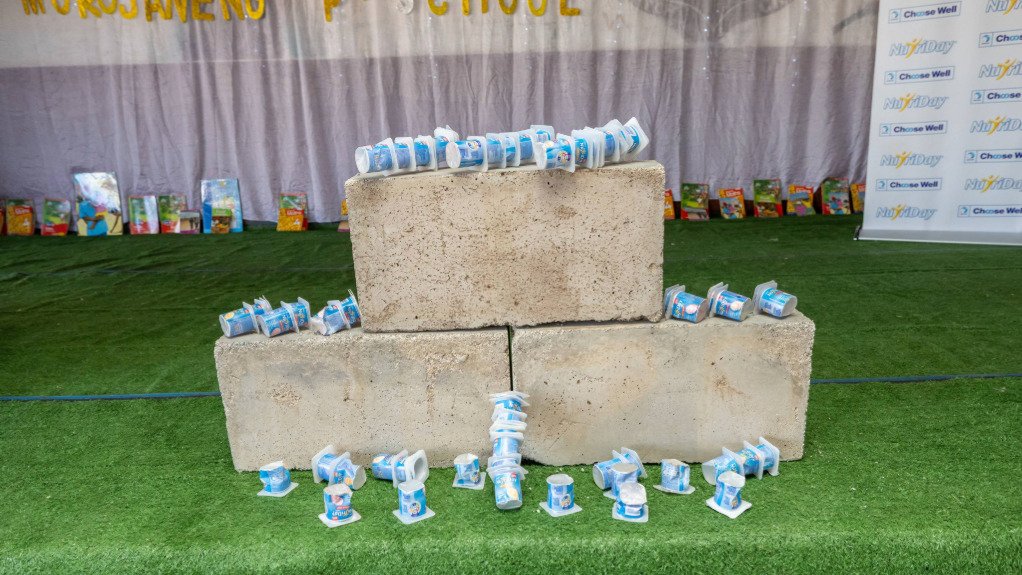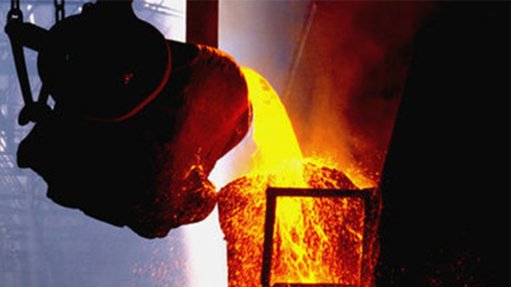Manufacturer embarks on sustainability drive



TUBS TO BRICKS Between 2021 and 2023, Danone sought to repurpose high-impact polystyrene, commonly used in yoghurt containers, into lightweight bricks that are certified by the Green Building Council South Africa and the Council for Scientific and Industrial Research
Photo by Danone
JESSICA MUNSAMI At Danone, we ensure that every food contact packaging material sourced is validated for food safety before being used at our manufacturing sites
Photo by Danone
Food safety helps to prevent illness, reduce healthcare burdens and ensure consumer protection, but long-term sustainability has also gained prominence among food producers of late, resulting in multinational food products corporation Danone South Africa’s (SA’s) introducing a new power source to reduce its greenhouse-gas (GHG) emissions by 40%.
The company will launch its first combined heat and power source next month to generate energy for its local factory, in Boksburg, says Danone SA quality and food safety director Jessica Munsami.
The company is also targeting a 30% absolute reduction in methane emissions from fresh milk used in dairy products, which will make it the first food company in South Africa to align its emissions targets with the Global Methane Pledge.
“One hundred percent of Danone SA’s farming partners have integrated regenerative agriculture practices at their operations, including practices that promote soil health and protect biodiversity,” she elaborates.
Further, Danone SA uses the GreenTrack tool – developed in collaboration with leading sustainability software developer UL – as a part of its comprehensive strategy to achieve net-zero emissions by 2050. This includes monitoring GHG emissions, energy consumption and packaging waste.
Further, Danone SA uses the GreenTrack tool with one key principle in mind: simplicity.
GreenTrack combines an intuitive interface for data collection with enhanced traceability and dynamic monitoring functionalities. Having been launched in 2019, the GreenTrack platform measures CO2 impact of Danone SA’s full value chain.
The tool aligns with broader climate actions and helps to transform the food system by, for example, monitoring how ingredients are grown, how products are manufactured and distributed, and what happens to food and packaging after consumption.
Danone SA’s strategy also entails setting specific targets for reducing carbon emissions across the full scope of the company’s direct and indirect emissions as validated by the Science-Based Targets initiative.
Meanwhile Danone SA collaborated with 180 schools for a recycling education campaign and yoghurt container collection scheme between 2021 and 2023.
Munsami explains that high-impact polystyrene is commonly used in yoghurt containers, and has one of the lowest recyclability rates, prompting Danone SA to collaborate with materials science experts to explore ways of repurposing it into lightweight bricks.
The scheme resulted in the students collecting yoghurt containers that were used as an input for the bricks, which, in turn, were used to build classrooms, once the bricks had been certified by the Green Building Council South Africa and the Council for Scientific and Industrial Research.
Prioritising Packaging
Danone SA works closely with its extended producer responsibility organisations (EPROs) to create sustainable collection and recycling ecosystems for the materials it makes available on the market.
Munsami says packaging is important, as it maintains the safety and integrity of foods, protects products from physical and chemical damage, and from external contaminants that can cause microbiological contamination.
Some packaging has a barrier property, protecting the contents against external elements, such as oxygen, light and moisture, and this can help to prolong the shelf life of certain products, avoid spoilage and maintain quality.
“At Danone, we ensure that every food contact packaging material sourced is validated for food safety before being used at our manufacturing sites,” Munsami adds.
The company ensures that the packaging is fit for purpose, while also communicating essential information – such as expiry dates, nutritional and allergen information, and serving sizes – to customers.
The packaging is designed with sustainability in mind, ensuring that Danone products have an “end-of-life solution” to avoid it reaching landfills, says Munsami.
Consequently, the company is aiming to achieve BCorp certification in 2025. Nonprofit organisation B Lab extends BCorp certification to companies for meeting high standards of social and environmental performance, accountability and transparency.
These companies aim to “balance profit and purpose”, benefitting all stakeholders including employees, communities and the environment. With this certification, the company will have met rigorous social and environmental criteria.
Additionally, Munsami explains that the certification would help Danone SA prioritise sustainable packaging among other business practices. This approach is an integral part of this ambition.
She notes that this will ensure that Danone SA addresses consumer demands while also contributing positively to the environment.
“We have a mature food safety management system that prioritises food safety in every area of the value chain. These areas are in the design of products, and sourcing of ingredients and packaging,” she adds.
The system prioritises the conversion of ingredients into products, and the logistics and transportation of foods to customers.
Danone SA is fully supported by a global organisation of leaders and experts that focuses on procedures that allow for “analytical excellence” in the company’s laboratories and in the development of food safety tools and processes.
“By empowering our quality and food safety teams with functional training, upskilling our employees on emerging risks and new developments, adhering to local regulations and the Danone Global Quality and Food Safety Requirements, and applying the strictest possible standards at all times we are able to deliver safe and high- quality food products on a consistent basis,” concludes Munsami.
Article Enquiry
Email Article
Save Article
Feedback
To advertise email advertising@creamermedia.co.za or click here
Press Office
Announcements
What's On
Subscribe to improve your user experience...
Option 1 (equivalent of R125 a month):
Receive a weekly copy of Creamer Media's Engineering News & Mining Weekly magazine
(print copy for those in South Africa and e-magazine for those outside of South Africa)
Receive daily email newsletters
Access to full search results
Access archive of magazine back copies
Access to Projects in Progress
Access to ONE Research Report of your choice in PDF format
Option 2 (equivalent of R375 a month):
All benefits from Option 1
PLUS
Access to Creamer Media's Research Channel Africa for ALL Research Reports, in PDF format, on various industrial and mining sectors
including Electricity; Water; Energy Transition; Hydrogen; Roads, Rail and Ports; Coal; Gold; Platinum; Battery Metals; etc.
Already a subscriber?
Forgotten your password?
Receive weekly copy of Creamer Media's Engineering News & Mining Weekly magazine (print copy for those in South Africa and e-magazine for those outside of South Africa)
➕
Recieve daily email newsletters
➕
Access to full search results
➕
Access archive of magazine back copies
➕
Access to Projects in Progress
➕
Access to ONE Research Report of your choice in PDF format
RESEARCH CHANNEL AFRICA
R4500 (equivalent of R375 a month)
SUBSCRIBEAll benefits from Option 1
➕
Access to Creamer Media's Research Channel Africa for ALL Research Reports on various industrial and mining sectors, in PDF format, including on:
Electricity
➕
Water
➕
Energy Transition
➕
Hydrogen
➕
Roads, Rail and Ports
➕
Coal
➕
Gold
➕
Platinum
➕
Battery Metals
➕
etc.
Receive all benefits from Option 1 or Option 2 delivered to numerous people at your company
➕
Multiple User names and Passwords for simultaneous log-ins
➕
Intranet integration access to all in your organisation




















